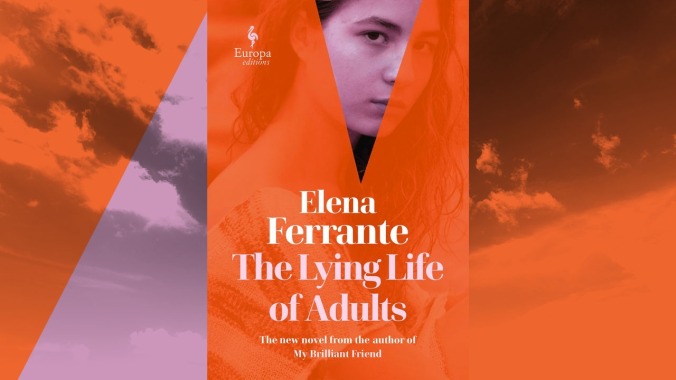A girl obsesses over The Lying Life Of Adults in Elena Ferrante’s latest novel
Aux Features Book Review
“The truth is difficult, growing up you’ll understand that, novels aren’t sufficient for it.” This proclamation in Elena Ferrante’s latest novel, The Lying Life Of Adults, is so in keeping with the derisive ways the pseudonymous author’s characters treat bookishness and intellectualism that a reader might miss it. But in contrast to the famous Neapolitan Quartet, The Lying Life Of Adults is not a bildungsroman of two relatively poor girls. It is essentially the inverse. In this rarefied world—one that is averse to religion, “speaking in dialect,” and any suggestion of vulgarity—a derisive comment about novels from a refined adult who otherwise puts her trust in them has a hidden agenda: as if to say, the particular truth discussed is so difficult, and rare, that not even a novel can contain it.
Giovanna, the narrator writing from an unspecified future about her teenage years, is a wealthy girl who lives in “the Naples of the heights.” Her father teaches history and philosophy “in the most prestigious high school in Naples”; her mother, Latin and Greek, while also correcting proofs of romance novels. As a character, Giovanna is elementally different from Lila and Elena, but it takes about 50 pages for the reader to realize it. Giovanna obsesses over her perceived lack of beauty—the book begins, “Two years before leaving home my father said to my mother that I was very ugly”—and dwells far less on her performance in school. Giovanna is also far more interested in the lives of adults, not her friends. She wants to know more about her father, a man she loved deeply, but she knows that “there were two fathers very different from the one I loved, and I had started to discover their existence at the age of seven or eight.”
Giovanna’s fixation gives the book both its title and inciting incidents: In relating to her mother that Giovanna is ugly, her father compares her to his estranged sister, Vittoria, a much-feared and apparently hideous character who, like the rest of her father’s family, lives “in the depths of the depths of Naples.” This begins a journey of endless obsession about Vittoria—a woman who her father hates, and who hates her father in return. Giovanna slowly descends into these depths, and as she begins to understand Vittoria’s rancor against her parents, she becomes a “spy,” not for Vittoria as much as herself. Soon enough, her father leaves home, and Giovanna suspects that her mother is sleeping with her father’s friend Mariano. The truth is that her father has been having a decades-long affair with Mariano’s wife, Costanza.
It is Costanza—obliquely pictured as a figure with a static Stepford-wife like sheen—who says that novels aren’t sufficient for truth. That her father could be capable of such betrayal is deeply abhorrent to Giovanna but, surprisingly, hardly noted by her aunt, who looks for all sorts of evidence to paint her brother as evil. In this way, the messy realities of adults’ lives become part of Giovanna’s development: Forced into being a spy and a liar, she ultimately comes to see herself as a bad person. Ferrante’s prose is, as always, sharp and intimate, her situations loaded, but what precisely this is a story of is more difficult for the reader to suss out than in any of her other books. Giovanna wonders baldly, “What happened… in the world of adults, in the heads of very reasonable people, with their bodies loaded with knowledge? What reduced them to the most untrustworthy animals, worse than reptiles?” Here the comparison with Lila and Lenù is perhaps most potent: What surprises Giovanna is almost obvious to the adolescents of My Brilliant Friend, and thus uninteresting. Giovanna has gifts of her own, to be sure, but the space between reality and her perception seems far wider than it ever did with Lenù. She is, simply put, naïve.
Why does naiveté of this sort feel so new, even for Ferrante’s highly self-aware prose? Because of class. In My Brilliant Friend, where the girls grow up, where a wealthy family owns a shop, where Lila lives with her first husband—they all exist on a spectrum. The Lying Life Of Adults is more binary on class and the geography of the city. The character who electrifies the novel’s plot—Vittoria—is poor; she rails against the classism of Giovanna’s parents. And though she manages to do little to actively intervene in anyone’s life, her spiritedness is what makes Giovanna aware. What Vittoria lacks in agency, she makes up for with this awareness—and the novel suffers from her absence as Giovanna grows up. But it’s a brilliantly simple construction: A woman and her niece are connected, in a cruel momentary lapse by the child’s father, and the child believes, for better or worse, that she is like her aunt. The novel is so single-minded on class and Giovanna’s naiveté that when, unlike with Lenù, other characters find Giovanna potently intelligent, it’s hard for the reader to fully believe it. Ultimately, Ferrante marches straight through the story of a wealthy child’s loss of innocence, and the novel only ends when the process is complete, if perhaps too abruptly.
To be sure, Ferrante is too sophisticated a writer to make honest and intelligent people only out of those who are not rich. But for Giovanna, that is how the world seems to operate. In a very different way than ever before, Ferrante has fashioned a knotty polemic about class and the shelters it provides. The kind of truth Costanza hides—that of her affair—is not “difficult”. It is simply debased and shameful, and the novel is sufficient for it.